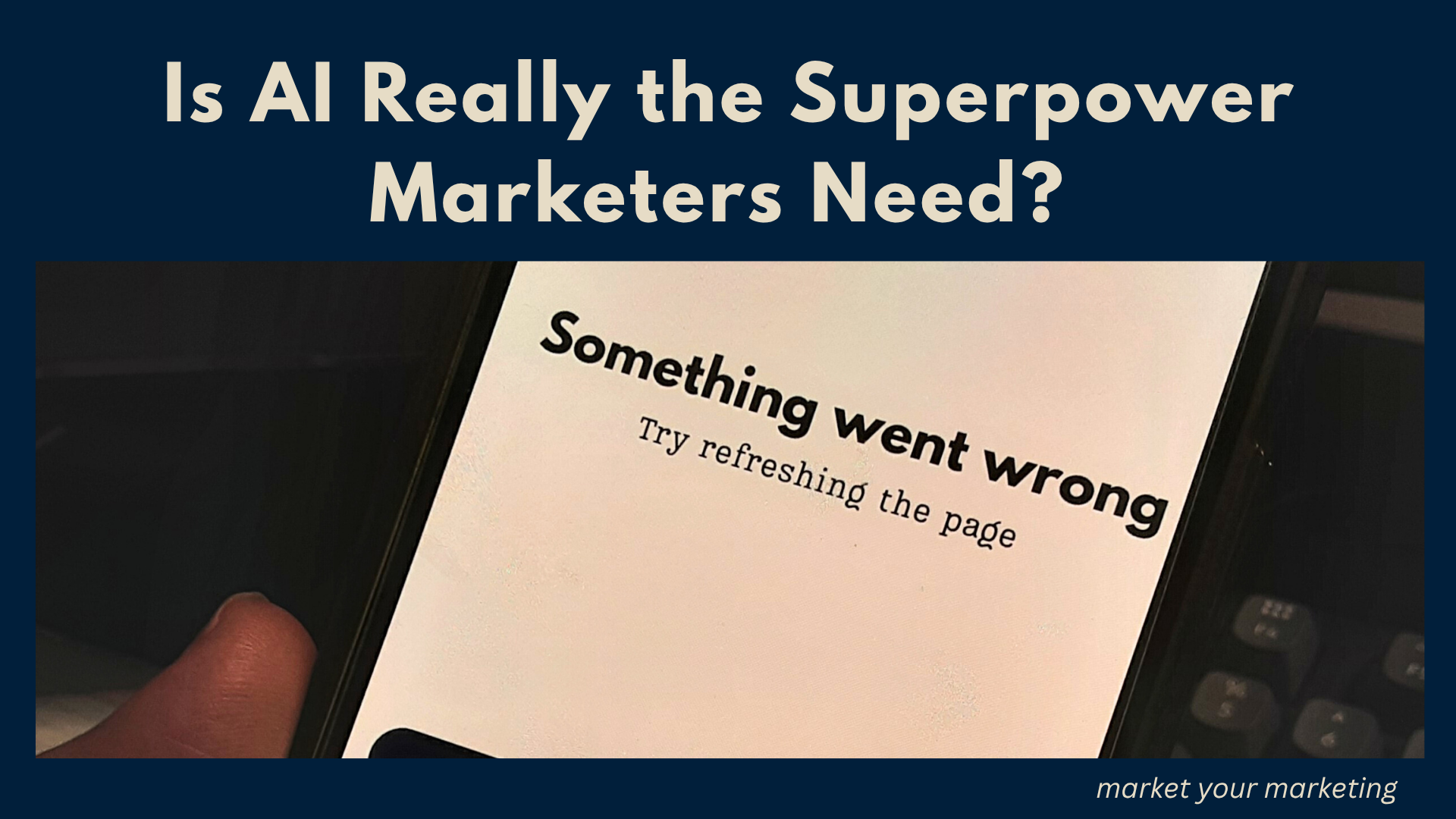
The Allure of AI
AI is the big, career-making technological shift in view right now. I know many marketers who have dedicated significant time to diving deep into AI, learning tools, testing prompts, and signing up for courses. Some of these resources are inspiring; others, a bit basic. After all of the experimenting, I’ve started to wonder if the real differentiator is a marketer’s technical fluency or their flexibility.
According to Business Insider’s 2025 analysis of BCG research, only around 5 percent of companies are realizing measurable value from AI initiatives (Business Insider, 2025). Yet McKinsey estimates that AI could add $0.8–$1.2 trillion in annual value to marketing and sales (McKinsey, 2023). That gap represents a huge opportunity, and marketing is one of the areas most likely to see meaningful impact once organizations learn how to use AI well.
Taking that to heart, I’ve been experimenting with how AI can facilitate the work I do. One area is research. As of October 2025, nearly every major LLM includes a research or browsing function. It’s excellent at pulling credible sources into a concise, digestible summary, saving me hours of time navigating the vast internet.
But there’s a caveat. If I took the information at face value, without validating sources or checking for hallucinations, I’d end up with a lot of inaccuracies. So I still review citations, confirm context, and ensure that data is real. The hours saved are fewer, but the quality and confidence are higher because a human still needs to stay intertwined in the process.
Maybe the real superpower isn’t mastering AI at all. Maybe it’s a marketer’s willingness to keep learning whatever comes next.
Adaptability: The Real Superpower
AI might make work faster, but adaptability makes it sustainable.
The World Economic Forum: Future of Jobs Report (2025) notes that resilience, flexibility, agility, curiosity, and lifelong learning are the skills that most distinguish growing jobs (World Economic Forum, 2025). Despite that, employers still post job listings demanding experience with specific tools or platforms. When those platforms change, those static skills lose value. Adaptability, on the other hand, scales across tools, technologies, and trends.
Over my career, I’ve worked with several traffic-management systems for creative teams, from the very manual to the highly automated. Early on, I used spreadsheets and paper forms that moved physically from one desk to another. Learning those manual processes taught me how creative workflows function at their core, how requests move, how bottlenecks appear, and how handoffs succeed or fail. That understanding made it easy to adapt to new systems, even as automation and complexity increased.
Knowing how to work a system is valuable; understanding why it works is transferable. And even the most sophisticated tool will fail if it’s built on workflows that people do not adopt or understand.
The same principle applies to AI. Being literate in AI helps you today, but being adaptable keeps you relevant tomorrow.
Real-World Proof: When the Systems Go Down
Technology keeps evolving, and sometimes it just stops.
The recent AWS outage took down platforms like Monday.com, Amazon services, and countless other systems that marketers rely on to plan, communicate, and deliver work. For a few hours, dashboards froze, automations failed, and entire workflows came to a halt.
In moments like that, AI cannot save us. The tool is not the hero. The people are. The teams that stayed calm, communicated clearly, and found short-term workarounds kept their projects moving. They did not panic or point fingers. They adapted.
That is the real superpower.
When a system goes down, you find out quickly who understands the work beyond the tool. The marketers who knew why their processes worked could rebuild them manually or in alternate systems. The ones who only knew how to click through a platform had to wait for the lights to come back on.
Every time technology fails, we get a reminder that adaptability is not a backup plan; it is the operating system.
The same truth applies as AI becomes more deeply integrated into marketing. Tools will break. Data will disappear. Algorithms will change. What keeps us relevant is not how many tools we can use, but how resourceful we are when those tools fail.
The Human Multiplier: Why Marketers Still Matter
AI can analyze data, automate workflows, and generate content, but it cannot understand context. It cannot sense when a message lands flat, when a customer’s tone changes, or when a story feels authentic. That is where marketers still matter most.
Technology can scale output. People scale meaning.
Even as AI becomes embedded in marketing systems, it is our ability to interpret, connect, and translate that creates impact. Marketing’s strength has always been human insight. AI can make it faster, but it cannot make it resonate.
I saw this while building a Perplexity Space to analyze webinars for my team. The AI gathered data quickly, summarizing who attended, what topics performed best, and how we could improve. But those insights only became valuable once I reviewed them, filtered out irrelevant points, and shared the takeaways in a way that connected to business goals.
The tool provided information. The human created understanding.
That is the difference between automation and adaptability. Automation accelerates what already exists.
Adaptability allows us to see what could be better.
As AI continues to evolve, marketers who combine technical literacy with curiosity and emotional intelligence will be the ones who thrive. They will use AI to uncover patterns but rely on human judgment to decide what those patterns mean and how to act on them.
When you pair that adaptability with visibility, sharing what you learn, testing ideas openly, and inviting collaboration, you build trust. You become not just a marketer who uses AI, but a marketer who helps others understand it.
Make Adaptability Visible
Adaptability only becomes influential when others can see it.
I shared in a previous post how marketers can make their work and learning more visible through simple reflection and reporting habits. That same approach applies here.
If you have not read it yet, revisit If You Don’t Report It, Did It Really Happen?, where I outline a practical framework for making marketing outcomes—and personal growth—visible across teams.
The essence is this: do not hide your learning process. Share experiments in progress, talk about what you are testing, and invite feedback. Visibility of curiosity signals adaptability. It shows others that you are not waiting for the next big change to prepare, you are already preparing through everyday learning.
Adaptability becomes a superpower when others can see you using it.
The Future Belongs to the Adaptable
AI will keep evolving. Today’s breakthrough will be tomorrow’s baseline. But curiosity, flexibility, and the willingness to keep learning will never become obsolete.
When AWS went dark, adaptable teams stayed visible. When tools change again, and they will, the marketers who think critically, stay curious, and keep sharing what they learn will remain indispensable.
AI may be the bright and shiny skill, but adaptability is the one that lasts.



